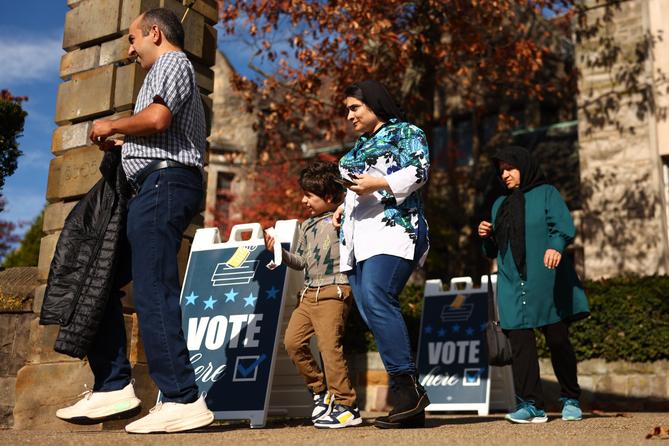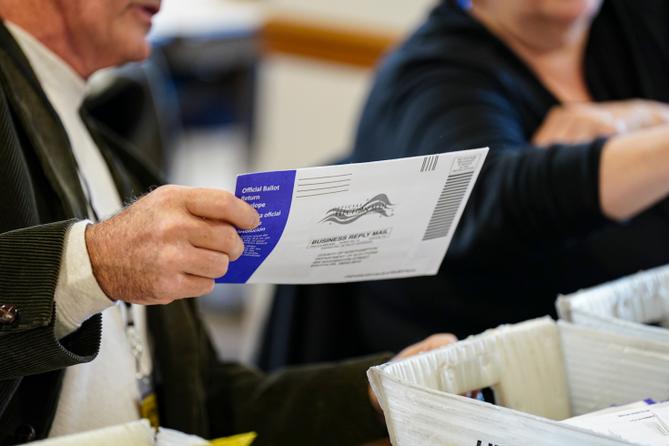Updated, Nov. 7 at 4:30 p.m.: Republican Dave McCormick defeats Bob Casey to win U.S. Senate seat in Pennsylvania
Update, Nov. 6 at 7 a.m.: Donald Trump won Pennsylvania and the presidency, while the GOP swept races for attorney general, auditor general, and treasurer.
Original story
HARRISBURG — The polls are closed in Pennsylvania after an Election Day that saw sporadic issues affecting in-person voting, long lines at college campuses, and what appears to be high turnout.
Now, the real test begins.
Eyes around the country are on the commonwealth as election workers tabulate ballots. Officials in key counties told Spotlight PA that it could take days to deliver unofficial results. That will affect when media outlets including the Associated Press can make calls in key races, though the timeline will depend on how close the results are.
>> MORE: Latest results from the 2024 Pennsylvania general election
Pennsylvania is expected to be a decisive state in the outcome of the presidential election between Democratic Vice President Kamala Harris and Republican former President Donald Trump.
Also on the ballot was a race for one of Pennsylvania’s U.S. Senate seats between incumbent Democrat Bob Casey and Republican Dave McCormick. Voters also considered contests for state attorney general, auditor general, and treasurer.
A handful of competitive races will also determine control of the closely divided state House and the partisan balance of the Republican-led state Senate.
Most polls closed at 8 p.m. A judge ordered polling places in Cambria County to stay open until 10 p.m. because of issues with voting machine scanners, while Luzerne County was ordered to keep the polling location in Laflin Borough open until 9:30 p.m.
A handful of bomb threats were also reported in counties across Pennsylvania, including Clearfield and Centre. As of 9 p.m., there did not appear to be a credible threat.
Counties were only able to begin processing mail ballots at 7 a.m. That’s been the case since 2020, the year after Pennsylvania lawmakers voted to institute no-excuse mail voting but failed to give county officials time before Election Day to process those ballots. In recent election cycles, it has sometimes taken days to count enough ballots for news agencies to project a winner, and weeks to officially certify election results.
Trump took advantage of the slow count in 2020 to spread disinformation about mail voting, arguing falsely the election was stolen from him as counties continued processing ballots.
After casting his vote in Florida on Tuesday, he told reporters it’s an “absolute outrage” that Pennsylvania may not have unofficial results for a few days. Later that afternoon, he claimed on Truth Social, without providing any evidence, “A lot of talk about massive CHEATING in Philadelphia. Law Enforcement coming!!!” City officials said there was no truth to Trump’s claim, with a Republican city commissioner calling it “disinformation.”

Abortion, the economy motivate voters
Across the state, voters who said they were supporting Harris for president cited abortion access as a motivating issue.
Shahrooz Pourmonir, 66, lives in Jenkins Township, Luzerne County, a once-blue stronghold that Trump won in 2016 and 2020. He voted for Hillary Clinton in 2016, and said he hasn't cast a vote since Trump beat her.
“Once Hillary won the popular vote and he became president, I thought, ‘This is bogus,’” he said.
But eight years later, he stood in a long line outside a firehall ready to vote for Harris at the urging of his three daughters. All are in the Coast Guard, and were concerned Trump and Republicans would take away their right to an abortion. So, despite his misgivings, the retired bus ticket agent went to the polls.
Brenda O’Hara, 55, a nine-year resident of Bensalem, Bucks County, voted for the first time for one reason: abortion.
She didn’t have issues with Trump, she said, recalling the economic stimulus and enhanced unemployment benefits people received during his administration.
But when the U.S. Supreme Court, with the help of Trump-appointed justices, overturned Roe v. Wade, she couldn’t abide the government interfering with a personal choice.
“One, you don’t get the right to judge women because you’re not one,” O’Hara said. “Two, you’re not God.”
Voters who said they backed Trump reliably pointed to immigration and the economy as top issues.
“A better America for my kids. Affordability. Housing. Gas. Food,” 57-year-old Brian Allen, who lives in Lower Paxton Township, Dauphin County, said when asked what motivated his vote.
David Newhouse, a registered Republican in Philadelphia, said he cares most about the economy and safety.
“I usually vote for what I think affects me,” he said. “And I just feel like a dollar doesn’t stretch as much. It’s a little bit difficult to survive, sometimes, with this economy. Just living paycheck by paycheck. I want it to be a little bit better, to have a better future for our kids.”

In-person versus mail voting
Pennsylvania approved nearly 2.2 million applications for mail ballots. As of 2 p.m. Tuesday, voters had returned 1.9 million. Of those, 55% were returned by Democrats, 33% by Republicans, and 12% by other voters.
Processing operations appeared to be going smoothly across the state including in Philadelphia, where voters returned at least 185,366 ballots.
“[We’re processing] much quicker than 2020,” City Commissioner Seth Bluestein said.
In Allegheny County, officials said 222,343 ballots had been scanned just before 8 p.m. “We anticipate results of 186,034 mail in ballots to post shortly after 8 pm,” the county said on social media. “The next batch of about 36,000 will post as soon as the data is done uploading.”
County officials will tell the Pennsylvania Department of State at midnight how many ballots they have left to tabulate, which will enable observers to roughly calculate when they will be finished.
Voters offered different reasons Tuesday for coming out in person, rather than submitting a mail ballot.
In Pittsburgh’s Hill District, 70-year-old Joyce Booker said she likes the atmosphere of voting in person. Ann Stiliha in Jenkins Township, Luzerne County, said her mail ballot only arrived that morning.
Olivia Feliciano, a 21-year-old Penn State student, said she decided to vote in person because she felt “uneasy” about the mail-in system, citing concerns over ballots being set on fire in three states leading up to the election.
“I just wanted to make sure for my own ease, just to do it in person,” she said.
Stephen Caruso, Angela Couloumbis, Danielle Ohl, and Marley Parish of Spotlight PA, and Votebeat’s Carter Walker contributed reporting.
